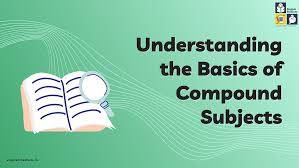Compound Subjects
Compound subjects
Compound subjects are sentence components that consist of two or more subjects that share the same verb or predicate. These subjects are connected by coordinating conjunctions such as "and," "or," or "nor." When combined, the compound subject functions as a single unit and requires a plural verb.
Here are a few examples of compound subjects:
Lisa and John are going to the movies.
In this example, "Lisa" and "John" form a compound subject connected by the conjunction "and." The plural verb "are" agrees with the compound subject.
The cat, the dog, and the rabbit are playing in the garden.
In this sentence, "the cat," "the dog," and "the rabbit" create a compound subject. The plural verb "are" matches the compound subject.
Swimming, hiking, and cycling are my favorite activities.
Here, the gerunds "swimming," "hiking," and "cycling" form a compound subject. The plural verb "are" agrees with the compound subject.
Either you or I am responsible for the mistake.
In this example, "you" and "I" are the compound subjects connected by the conjunction "or." The singular verb "am" agrees with the compound subject.
Remember that when using compound subjects, it's essential to match the verb form to the number of the compound subject (singular or plural).
Predicted nominatives
Predicted nominatives refer to the subjects or nouns that are anticipated or expected to perform a particular action or fulfill a certain role in a sentence. These nouns are not explicitly stated in the sentence, but rather inferred based on the context or logical deduction.
Here are a few examples of sentences with predicted nominatives:
"The cake is in the oven, and it should be ready soon."
In this sentence, the predicted nominative is "the cake." Although not explicitly mentioned in the second part of the sentence, it is understood that the cake is the subject that will be ready soon.
"The team is practicing diligently, hoping for a victory."
Here, the predicted nominative is "the team." While not explicitly stated in the second part of the sentence, it is inferred that the team is hoping for a victory based on the context.
"She handed me a book, asking for my opinion."
In this example, the predicted nominative is "she." Although the subject is not mentioned in the second part of the sentence, it is implied that "she" is the one asking for an opinion.
"He walked into the room, startling everyone."
The predicted nominative in this sentence is "he." Although the subject is not mentioned in the second part, it can be inferred that "he" is the one who startled everyone by walking into the room.
Predicted nominatives help to provide clarity and coherence in a sentence by allowing readers or listeners to make logical connections and understand the intended meaning




No comments yet
Be the first to share your thoughts!